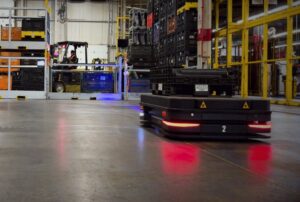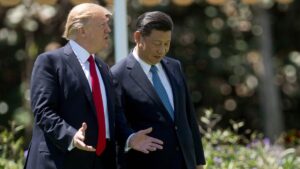Even though at the start of the unprecedented artificial intelligence race that kicked off at the end of 2022 and beginning of 2023, search giant Google looked like it lagged behind the Microsoft/OpenAI team and later on, Meta, the cards now appear to be reshuffling once again.
In recent months and weeks, Google has become more aggressive in asserting it has caught up to competitors, particularly witnessed through the unveiling of “AI Mode” and a new video-focused model, “Veo 3.”
In tech circles, the “AI Mode” has been seen not only as a new feature but as a sort of paradigm and a significant addition to the company’s AI offering that could actually put Google back on track to fight rising competition.
Experts also consider it “a strategic adaptation aligned with the rise of AI-powered search,” and “an adjustment to evolving tech habits.”
Google itself says it is “our most powerful AI search, with more advanced reasoning and multimodality, and the ability to go deeper through follow-up questions and helpful links to the web.”
‘Transform’ user experience
“AI Mode has the potential to transform user experience through contextual responses and extensive data integration,” said Alp Cenk Arslan, an AI and security expert and an assistant professor at the Turkish National Police Academy.
However, he argued that claiming that this move “defends” Google’s leadership in the search engine market “may overlook current competitive dynamics.”
He cited that its rivals, like Perplexity AI and OpenAI’s SearchGPT, are pushing user habits by offering innovative solutions in niche areas such as academic research.
Arlsan noted it’s also important to consider the 2025–2026 search trends. “In these years, search engines are likely to shift from traditional keyword-based models to AI-supported, multimodal systems (text, image, voice),” he told Daily Sabah.
Erman Akıllı, professor in the Department of International Relations at Ankara Hacı Bayram Veli University and assistant editor at Insight Turkey journal, considers that “we’re now witnessing a new transformation,” as large language models (LLMs) have become “a part of everyday life for tech-literate users today.”
He said that we can interpret Google’s move as sort of “an adaptation to evolving technological habits,” suggesting still that “what Google AI Mode generally offers – such as speed and accuracy – is already being provided by Perplexity.”
Perplexity AI, also known only as Perplexity, founded in 2022, is an AI-driven search engine and chatbot that uses LLMs to answer user queries, also providing them with multiple web links on a certain topic. The startup, backed by Nvidia was last month in advanced talks to raise $500 million in a funding round that would value it at $14 billion, according to a Wall Street Journal (WSJ) report.
Although citing that one could say Google’s throne “is being shaken,” while drawing comparisons between the time it entered the market in the early 2000s (like AltaVista, Yahoo), managing to rise to a dominant position, Akıllı said that LLMs are part of everyday life now.
“In a sense, just as Google’s rise in the early 2000s brought about a new technological habit – even giving rise to expressions like ‘Google it!’ – we’re now witnessing a new transformation. In this context, one could say Google’s throne is being shaken,” he said in a response to a query by Daily Sabah.
“Companies may develop alternative approaches to Google, but in the end, this would be very costly,” he added.
“On the other hand, if LLMs like Perplexity come to function as search engine alternatives in the market, it will be difficult to speak of Google’s former importance. Even today, using Google can feel like relying on technology from the previous century,” he furthered.
Arslan, however, sees that Google “may maintain its lead thanks to its data scale and infrastructure advantages (like location data),” but also arguing that startups such as Perplexity “can gain trust through features like citation and transparency.”
Moreover, attributing it to spatial technologies and prompts, Akıllı said that users “can now express themselves more effectively to LLMs.” He noted this can be done “sometimes by uploading an image or sharing an analysis file” or conducting their searches “much more successfully online.”
That’s why Google’s AI Mode initiative “can be seen as a manifestation of its effort to survive over the next decade,” according to Akıllı.
At the same time, Arslan cited certain risks. “Google’s AI Mode may face technical and ethical challenges such as hallucinations and privacy concerns,” he said, adding that Apple’s reported plans to integrate alternative AI search engines into Safari could also threaten Google’s default search engine revenue.
Risks, competition
The company is already a party in a long legal process in the U.S., which could see the court forcing it to sell Chrome, its web browser, after a judge last year declared it held a monopoly in the search market.
“Although Google appears likely to maintain a dominant position in 2025–2026, it still faces the risk of losing market share,” said Arslan.
On a question, could some other new startup apart from Perplexity be a rival to Google, Akıllı said that it is “definitely possible,” mentioning that we don’t know what kinds of projects are currently cooking in startup incubators.
While pointing to developments related to Chinese startups, he said that China-based models like DeepSeek, Manus, and Qwen are “also quite striking.”
“The U.S. and the West more broadly are investing in these models and supporting startups, but in the coming years, we may see significant technological breakthroughs from many different parts of the world, particularly from the Gulf region,” he added.
Back on Perplexity AI, Arslan said that its rise over the past year has demonstrated that AI-focused search engines can challenge traditional models.
“However, Google’s data, infrastructure, and brand strength make it difficult for startups like Perplexity to reach broad audiences in the short term,” he stated. He compared the user base of both, suggesting that Perplexity’s over 10 million monthly active users are “limited” when compared to Google’s billions.
“Other startups also deserve attention. Initiatives like Safe Superintelligence could enter the AI search space, but Perplexity’s current momentum sets it apart,” Arslan said, referring to Safe Superintelligence (SSI), a relatively newer player on list, significant since it was co-founded by OpenAI’s former chief scientist Ilya Sutskever.
Moreover, Arslan said that their success “seems (to be) tied to focusing on niche markets and forming strategic partnerships with major platforms.”
At the same time, both Akıllı and Arslan also briefly evaluated other major developments in the field recently, including OpenAI’s partnership with Apple’s legend designer Jony Ive and U.S. President Donald Trump’s trip to the Gulf, which also put artificial intelligence deals in the spotlight.
On the topic of OpenAI-Ive, which created a fresh buzz due to reports related to a potential mystery gadget, the “io device,” Akıllı highlighted that the focus is now being placed on “the hardware dimension of this technology.”
He recalled that OpenAI and Apple’s former design chief are “reportedly working on a product that integrates AI (and from their statements, it seems like it will be an agentic AI model), an assistant we’ll carry with us like a smartphone.”
“There have been similar technology demos and products before, but they didn’t succeed due to financial issues and legal permissions. However, a product capable of running OpenAI’s GPT-4 or the upcoming GPT-5 could carry the potential to change our everyday habits,” he said.
‘Heart of global politics’
As for Arslan, he emphasized we “should focus more on the political and geopolitical dimensions” when it comes to AI.
“AI and technology now sit at the heart of global politics,” he said.
Mentioning that the AI ecosystem “has revived” at the end of 2024 and beginning of 2025 with investments in data centers, energy infrastructure, and hardware-focused partnerships, Arslan said that Trump’s recent trip to the Gulf highlights the geopolitical and economic facets of these developments.
“Saudi Arabia, Qatar, and the UAE have pledged investments totaling $1.5 trillion, placing AI and tech-focused agreements at the center of their agendas.”
“These deals support both U.S. economic interests and the Gulf states’ vision to reduce dependence on oil,” he added.
Furthermore, suggesting that “Gulf is striving to become the AI hub for the next century,” Arslan mentioned that all major tech companies, including Google, Nvidia, AMD, and OpenAI, “are accelerating their data center investments to meet the rising energy demands of AI models.”
“Concrete examples of this trend include Saudi Arabia-based DataVolt’s $20 billion data center investment in the U.S. and AMD’s $10 billion AI computing agreement with Humain,” he said.
He also said that Trump’s Gulf tour, in particular, has spotlighted sectors like AI, aviation, and energy. Moreover, he pointed out that the UAE’s deal for access to AI chips reflects “a trend of the U.S. relaxing tech export controls.”
Also drawing attention to other projects such as “UAE Stargate,” Arslan said it can be seen as “a new chess move in AI geopolitics.”
“These projects combine U.S. efforts to maintain data dominance with the Gulf’s drive to leverage its energy advantages,” he said.
“However, the Gulf states’ growing commercial ties with China and other global players could complicate U.S. technology transfer policies. While Trump’s merchant-like approach seeks to manage these relationships based on economic gain, some worry that this could pose long-term strategic risks,” he concluded.























































Be First to Comment